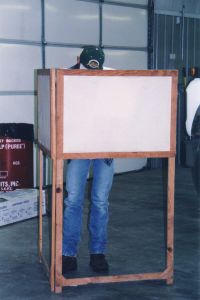Expert: Electronic Voting Machines Vulnerable

The electronic voting machines many states will use in the coming elections are vulnerable to security problems, experts have told Congress.
"Today, the state of electronic voting security is not good," David Wagner, associate professor of computer science at the University of California/Berkeley, told lawmakers earlier this year. "Many of today’s electronic voting machines have security problems. The ones at greatest risk are the paperless voting machines. These machines are vulnerable to attack: a single person with insider access and some technical knowledge could switch votes, perhaps undetected, and potentially swing an election. With this technology, we cannot be certain that our elections have not been corrupted."
Studies have found that there are effective security measures available to protect election integrity, but many states have not implemented them, said Wagner, also a member of the California Secretary of State’s Voting Systems Technology Assessment Advisory Board.
"The most effective defense involves adoption of voter-verified paper records and mandatory manual audits of these records, but only 13 states have mandated use of these security measures," he said.
At present, 27 states mandate voter-verified paper records, another eight states use voter-verified paper records throughout the state even though it is not required by law, and the remaining 15 states do not consistently use voter-verified paper records. Of the 35 states that do use voter-verified paper records statewide, only 13 require routine manual audits of those records, he said.
"Voter-verified paper records provide an independent way of reconstructing the voter’s intent, even if the voting software is faulty or corrupt, making them a powerful tool for reliability and security," Wagner said.
Voting machines have lost thousands of votes, Wagner said.
In Carteret County, NC, voting machines irretrievably lost 4,400 votes during the 2004 election, he said. The votes were never recovered. In 2002, vote-counting software in Broward County, Fla., initially mistallied thousands of votes, due to flaws in handling more than 32,000 votes; fortunately, alert election officials noticed the problem and were able to work around the flaws in the machines.
In Tarrant County, Texas, an approved voting system counted 100,000 votes that were never cast by voters, he added.
Among the recommendations Wagner suggested is to mandate voter-verified paper records and mandatory manual audits. Also, he said to eliminate conflicts of interest in the federal testing process. The independent testing authorities that qualify electronic voting systems should not be paid by the vendors whose systems they are testing, he said.
Rep. Sherwood Boehlert (R-N.Y.), chairman of the House Science Committee, said Wagner's recommendations on securing electronic voting systems should get attention.
That the recommendations may be expensive alone should not discount them, said Boehlert, who is retiring this year and not seeking re-election.
"How much is American democracy worth? As a nation, we ought to be as willing to invest in election equipment as we are in campaign ads," Boehlert said. "Frankly, we in Congress haven’t invested as much as we should in the development of the new standards, which have been delayed as a result. I’m not happy to learn that new standards are not likely to be fully enforceable until 2010 at the earliest – and that’s only in states that choose to adopt them," he added.
A webcast of the electronic voting systems hearing is available.


0 Comments:
Post a Comment
Subscribe to Post Comments [Atom]
<< Home